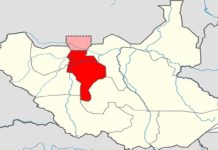Africa-Press – South-Sudan. A local official said that the much-awaited construction of the 40-kilometre Longechuk Road in Upper Nile State has resumed after a record 12-year lull.
The works that started in 2012 stalled despite three companies having been contracted to build the road from Paloch to Mangok of Longechuk County.
Longechuk County Executive Director Dobuol Duop Bichok told Radio Tamazuj Friday that the construction of the road resumed last week after the contract was awarded to companies such as Alex Company, Eagle Company and Petro South.
“The three companies will first level the road with soil. After that they will level it with murram as a second step,” he said.
“We are so happy that the three companies have agreed to construct the 40 km road. The construction will help us because it is the first of its kind since we signed the agreement three months ago. When the three companies complete the construction of the road, then the citizens will start transportation of the goods to Longechuk County,” he added.
Duop continued, “The construction of the road has now reached Mangok in Longechuk County, which is 40 Km from the Guelguk area. The community of Longechuk is very excited about the construction of the road. The national and state governments devised the initiative to construct the road. During the rainy season, people cannot travel between Longechuk County and Malakal due to inaccessible roads.”
The road network in South Sudan is characterised by limited coverage and capacity, presenting significant challenges for transportation and connectivity. The road infrastructure is underdeveloped, lacking paved roads and inadequate maintenance. The road network primarily consists of unpaved and poorly maintained roads, making transportation difficult, especially during the rainy season when many roads become impassable.
Coverage of the road network is limited, particularly in remote and rural areas. Primary roads connect significant towns and cities, but access to rural communities is often limited or non-existent. This hampers economic development, access to essential services, and the movement of goods and people across the country.
For More News And Analysis About South-Sudan Follow Africa-Press






